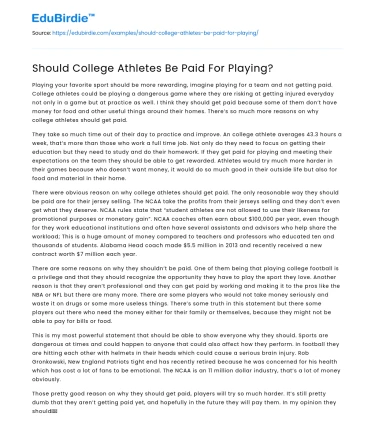Introduction
In recent years, the debate over whether college athletes should be paid for playing has gained significant traction. This issue touches on the intersection of amateurism, education, and the commercialization of sports. College athletes contribute immensely to university revenues, particularly in sports such as football and basketball, which generate millions of dollars through ticket sales, merchandise, and broadcast deals. Despite this, athletes receive no direct financial compensation for their contributions, raising ethical and practical questions about the sustainability of this model. The National Collegiate Athletic Association (NCAA) maintains that student-athletes should remain amateurs, focusing on their education and personal development. However, critics argue that this perspective overlooks the economic realities and demands placed on young athletes. This essay explores the arguments for and against compensating college athletes, examining the potential implications and ethical considerations.
Economic Contributions and Fair Compensation
One of the primary arguments in favor of compensating college athletes is their significant economic contribution to universities. According to a report by the NCAA, college sports generate over $14 billion annually, with a substantial portion stemming from athletics programs. For instance, the University of Texas reported in 2019 that its athletics program generated $223.9 million in revenue, primarily from football. These revenues demonstrate the substantial economic impact athletes have, yet they see no direct financial benefit from their efforts. This disparity raises questions about fairness and exploitation, as student-athletes dedicate countless hours to training and competition, often at the expense of academics.
Save your time!
We can take care of your essay
- Proper editing and formatting
- Free revision, title page, and bibliography
- Flexible prices and money-back guarantee
Proponents of compensation argue that athletes deserve a share of the revenues they help generate. Legal scholar Michael McCann suggests that paying athletes respects their labor rights, acknowledging their role as key contributors to the financial ecosystem of college sports. Providing athletes with a stipend or salary could also alleviate financial pressures, allowing them to focus more on education and personal development. By compensating athletes, universities could foster a more equitable and just environment, thus addressing longstanding criticisms of the NCAA's amateurism model.
Challenges and Counter-Arguments
Despite compelling arguments for compensation, there are also significant challenges and counter-arguments. Critics assert that paying college athletes could undermine the educational mission of universities. The NCAA's principle of amateurism is rooted in the belief that college sports should primarily serve as a platform for education rather than commercialization. Introducing financial incentives might shift the focus from academics to athletics, potentially compromising educational outcomes for student-athletes.
Additionally, there are logistical challenges in implementing a compensation model. Determining how to fairly compensate athletes across different sports and universities could prove complex. For example, should athletes in revenue-generating sports like football and basketball receive more than those in less popular sports? Moreover, smaller colleges with limited budgets might struggle to provide equitable compensation, leading to disparities and imbalances across the collegiate sports landscape. As former NCAA president Mark Emmert noted, "The complexity of college athletics requires careful consideration of the implications of any compensation model."
Potential Benefits and Ethical Considerations
Despite these challenges, compensating college athletes could offer several benefits. Financial compensation might empower athletes, giving them more control over their personal and professional lives. It could also enhance the attractiveness of college sports, potentially reducing the allure of turning professional prematurely. Furthermore, paying athletes could help address issues of inequality and exploitation, particularly among athletes from underprivileged backgrounds who face significant financial hardships.
Ethically, the principle of fairness supports compensating athletes who generate substantial revenue for their institutions. As journalist Taylor Branch argues, "The NCAA's current model exploits athletes by denying them a fair share of the profits they help create." Addressing this inequity is not only a matter of justice but also of modernizing the collegiate sports system to reflect contemporary economic realities. By compensating athletes, universities can demonstrate a commitment to ethical and sustainable practices that prioritize the well-being of student-athletes.
Conclusion
The debate over whether college athletes should be compensated for playing is multifaceted and deeply rooted in the complex interplay between education, economics, and ethics. While the economic contributions of college athletes are undeniable, the challenge lies in balancing these contributions with the educational mission of universities. Compensating athletes offers a pathway to addressing issues of fairness and exploitation, yet it also poses logistical and philosophical challenges. Ultimately, any decision regarding athlete compensation must consider the broader implications for collegiate sports and education. As the conversation continues, stakeholders must engage in thoughtful dialogue to develop a model that respects the rights and contributions of college athletes while preserving the core values of higher education.






 Stuck on your essay?
Stuck on your essay?

